











The website has general interest articles, a links page and specific sections for women, schools, higher education and correctional services. www.cpsu-spsf.asn.au FEDERAL WEBSITE













The website has general interest articles, a links page and specific sections for women, schools, higher education and correctional services. www.cpsu-spsf.asn.au FEDERAL WEBSITE
The first few months of 2024 have been an extremely busy time at the PSA, with Organisers visiting worksites across South Australia to talk with members about our plans for negotiating the next Salaried Enterprise Agreement.
This has been a great opportunity for members to say what they want to see in their next agreement. It also enables us to meet with those who have yet to join the PSA, to encourage them to be part of the process and have a say in achieving the industrial outcomes our public sector workers expect and deserve.
Coinciding with the worksite visits, we conducted a survey of members, which will also inform our priorities for negotiations.
Another hot issue that has emerged this year, which we cover in this Review, is the plight of our members in the Research and Collections division of the SA Museum. Under the leadership of the Museum board and a new CEO, the museum was being “re-imagined” in such a way that would result in the loss of many jobs and hundreds of years of experience from this much loved institution. As we go to press, the government has put on hold the
to this
of
“reimagining” and has appointed a review panel to recommend an alternative way forward for the Museum.
New legislation which came into effect on Christmas Day last year puts employers under much greater scrutiny to ensure psychologically safe workplaces. In this edition, we look at what the Work Health and Safety (Psychosocial Risks) Amendment Regulations 2023 mean for workers.
With COVID-19 becoming a distant memory for some, many employers are calling for staff to return to the office, but flexible working conditions – including working from home – have become an important aspect of work/life balance and productivity. Our article makes the case for continuing and expanding flexibility to support today’s workforce.
PSA Worksite Representatives do a wonderful job and in this edition we profile Jessie Skidmore from SA Pathology, highlighting the value she has found in taking an active role in her union.
There’s plenty of other useful information and advice in this Review. We hope you enjoy it.
Comments, letters and editorial
Designed and printed on recycled and sustainably sourced paper by Created 2 Print, 3 Thompson Street, Dry Creek SA 5094. www.created2print.com The Public Sector Review’s official publication number is PP565001/0010. Volume 8, Number 1. Responsibility for political content in this publication is taken by Natasha Brown. psaofsa.asn.au @PublicServiceAssociationSA @psa_of_sa

The upcoming South Australian state budget is an opportunity for this government to demonstrate a strong commitment to supporting the South Australian community through resourcing a strong and effective public sector.
The government must activate the necessary levers for the future attraction and development of public sector workers. Part of achieving that must include recognising the need for a recalibration of wages and conditions, if the public sector is to be a competitive employer of choice in the current labour market.
Our state is in a healthy financial position, with many revenue streams seeing record levels of growth over recent years. Now is the time to invest in the workforce that serves our state.
By choosing to invest in our public sector, the government would be clearly demonstrating that the wellbeing and sustainability of our community is a key goal. Anything short of investing in our public sector would be interpreted as a sign that the wellbeing and sustainability of our community is not a priority for them.
In the past, public sector remuneration, employment conditions, and the associated job security, all contributed positively to the public sector being an attractive option in the labour market. But after years of budget cuts and privatisation, the South Australian public sector is now languishing behind other competitors in the labour market on each of these elements.
The ability to attract and retain workers to the public sector is now at an alarmingly low level. Many agencies are unable to fill vacancies for prolonged periods of time. There are skills shortages in many critical areas of government.
With the rise in energy prices and record increases in the cost of living, members are struggling to make ends meet, and are looking outside of the sector for financial relief.
The government must budget for and provide remuneration and employment conditions which make the public sector competitive and attractive to workers.
Published public sector workforce data shows an increase in short-term contracts compared with the past five years, and a decrease in the number of, and the recruitment to, ongoing positions. This is particularly evident in the General Government Sector. This trend must be reversed.
The government must provide agencies with the budget framework to enable and encourage ongoing employment as the default form of public sector employment.
PSA members also report that the levels of complexity, responsibility and expertise assigned to, and inherent in, many positions do not reflect the classification levels assigned to those positions, adding to the difficulty in filling vacant positions and retaining existing staff.
All these factors contribute to staff shortages in a number of key areas within government employment, including allied health workers, child protection workers and justice workers, including lawyers and corrections officers. Failure to act now will inevitably result in a public sector that is unable to provide the services our community needs.
The PSA remains fundamentally opposed to increasing proportions of our state budget going to private business interests and global corporations who operate with relatively little public scrutiny and accountability.
While we welcome the government’s commitment to cease further privatisation, in particular the reversal of the train privatisation and committing to no more private prisons, more scrutiny of current privatised public services is required.
As with the failed privatisation experiment, the so-called ‘efficiency dividend’ has also had its day.
The compounding effect of annual cuts to agency budgets, and the assumption that the same work will be done with fewer resources, undermines the very services the public trusts the government to provide to our community. It is a blunt instrument and a demonstrated failure to drive real efficiencies.
The annual budget contraction and the consequent increase in workloads has a deeply discouraging impact on PSA members and the services they provide. It is no surprise that PSA members consistently rate the need to address unreasonable workloads as a high industrial priority.
The state budget must address all these issues. The PSA has raised these directly with the Treasurer and other Ministers. There must be a clear acknowledgement by this government in this state budget of the contribution, commitment, devotion and pride with which our state’s public servants serve their community.
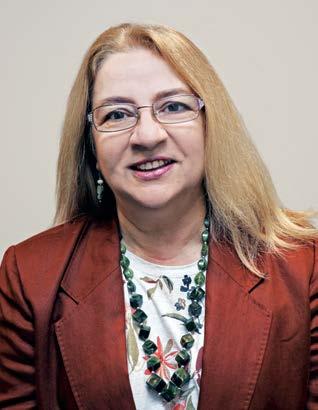
This year will be my 40th year as a member of the Public Service Association (PSA), which matches my tenure as a public servant. Being a member of my union has been an integral part of my career in the public sector. It was a decision I made all those years ago and one that I re-commit to each year, because I want to be part of the decision-making processes that affect me at work.
Being a union member is about actively taking charge to ensure that you are protected in the workplace – knowing that you are a part of a collective that has the power to influence positive change and also to question policies and practices that may adversely impact on your working life and career.
Many people see union membership like a car or house insurance policy, providing support and protection if and when you need it. There have certainly been times when I have had to call on my union for support when issues have arisen at work. Without that support, I would have been alone and vulnerable.
But being part of a union is so much more.
It is rare for individuals to make an impact on our world. Certainly, there are exceptions and exceptional individuals, but people truly have the power when they work together, and that is what being a union is all about. As PSA members, you and I are the union. Without us, there is no union and certainly no PSA office staffed by professionals who manage the day-today business of protecting our industrial rights and advocating on our behalf.
Membership of your union offers many opportunities and numerous benefits. Members can get involved in active roles such as being a Worksite Representative or by participating in campaigns,
explaining membership benefits to colleagues and reiterating what we as a union have achieved together on behalf of the public sector workforce.
“ Being a union member is about actively taking charge to ensure that you are protected in the workplace – knowing that you are a part of a collective that has the power to influence positive change.”
While all members benefit from the provision of industrial support, legal services, enterprise agreement negotiations and journey accident cover, the PSA also rewards members with access to a range of cost-saving benefits including discounted shopping and petrol cards, metroCARD recharges, cheap movie tickets, and great deals on theatre shows and the annual WOMADelaide festival. All of this can make a tangible difference to the household budget and even cover the cost of membership fees.
There is no doubt that cost of living pressures are biting hard, and many PSA members have to actively budget to retain their membership. I understand that, but I would encourage you to see your membership as an essential investment in your working lives. Your fees are also tax deductible. So if you can make your union membership cost neutral, why wouldn’t you?
This year, we will begin negotiations with the government over the next enterprise agreement for salaried staff. This agreement covers around 40,000 public sector workers in South Australia. The stakes are high and we all want a fair outcome that recognises and values the work public sector workers do and also the cost of living, which has severely hit our hip pockets. To be a force to be reckoned with, our best bet is to grow our numbers to increase our power at the negotiating table. It’s important to remember that what we have achieved in past enterprise agreements is not set in stone for all time. All of us, simply by being members of this union, work to protect those gains and achieve further improvements. Without us, there is no agreement and a corresponding threat that hard-won conditions, workplace rights and fair pay will be eroded.
I urge you to think about why you are a union member and why membership is important in your working life. Share your passion with those colleagues who have yet to be convinced of the value of being part of this wonderful collective. Encourage them to join the union that protects us and to lend their support to the voice that seeks a fair outcome for us all. I can’t see too many arguments against that.

Fair working conditions come from being strong as a union and having a strong union culture within our workplaces.
They come from PSA members like you and me standing united, sharing our message, growing our strength and holding firm on our rights. At the forefront of much of this are our PSA Worksite Representatives – dedicated members who make a choice to step up within their workplaces and to help others around them do the same.
The role of the Worksite Representative is crucial. It includes representing the PSA within workplaces, supporting and advocating for members, and building collective power so we can look out for each other. Worksite Representatives encourage people within workplaces to join our union and bring members together so their voices can be heard.
Right now, around the public and community sectors, PSA Worksite Representatives are bringing members together to improve conditions and address workplace issues. They are speaking with colleagues about the importance of joining the PSA so we can work together for better outcomes, to safeguard jobs and benefit all members. When it comes to the efforts of PSA Worksite Representatives, there is too much to list – so here are a few examples of what is happening right now.
A
At the South Australian Museum, PSA Worksite Representatives are working with their members, their PSA Organiser and our Industrial Team to fight against a planned hatchet job, which would see research and collections division jobs cut. This would be a death blow to the institution’s natural science and cultural heritage capabilities and its international reputation.
“
Workplace issues do not get better on their own. It takes union members – PSA members like you – working together to address them. Worksite Representatives are a central part of this.”
PSA Worksite Representatives in the Department for Child Protection are bringing members together and building PSA strength to address issues such as insecure work, crisis-level workloads, chronic underresourcing and, in at least one notable case, office overcrowding, which is affecting members’ work, safety and dignity.
In our state’s prisons, our well-organised and networked Worksite Representatives bring members working in an environment fraught with danger together to push for a commitment to safety, because everyone should be able to go to work knowing that they will go home uninjured at the end of their shift.
Across Health, PSA Worksite Representatives in specialised administration and allied health roles are leading local efforts and encouraging colleagues to join
and stand with them, to address issues including under-classification and severe staffing and workload issues impacting not only members, but all those who rely on our public health system.
This is only a small snapshot of the incredible work being done across the public sector by trained and supported PSA Worksite Representatives. With the countdown to the commencement of negotiations for a new Salaried Enterprise Agreement well underway, PSA Worksite Representatives are encouraging members to engage with their union and bringing colleagues into the membership – so as a union of thousands we are strong and united in support of a fair outcome.
We have many trained and dedicated PSA Worksite Representatives across the state, yet there are many worksites without one. Workplace issues do not get better on their own. It takes union members – PSA members like you – working together to address them. Worksite Representatives are a central part of this. If your workplace does not yet have a Worksite Representative, and you believe in working with the PSA to build union strength in your workplace, in helping your colleagues find the confidence to stand up, and in working to build a better workplace together – then you might like to talk with your PSA Organiser about becoming a PSA Worksite Representative. We will be proud to support you.


The Public Service Association (PSA) welcomed the announcement in late April by Premier Peter Malinauskas that the “reimagining” of the SA Museum is on hold and a special panel has been established to explore other options for the future operations of this leading cultural and scientific institution.
PSA General Secretary Natasha Brown said it was important to take the time to listen to the concerns of Museum workers and the community, and to determine the future plans for the Museum through genuine collaboration and consultation.
“The PSA and our members look forward to working collaboratively with the Premier’s advisory panel to develop a way forward that achieves the goals of our members and the broader community and doesn’t place the important work being done by Research and Collections staff in jeopardy,” she said.
“Any changes made at the Museum must ensure our members are supported in their important work in the ongoing discovery of knowledge and the appropriate care of the Museum’s priceless cultural and scientific collections.
Natasha Brown said it appeared that the Premier was also considering funding for the Museum.
“We welcome the Premier’s acknowledgement that funding cuts through so-called ‘efficiency dividends’ have caused great damage to the
Museum as they have to the public sector generally,” she said.
The PSA had earlier called on the state government to abandon plans to implement the radical restructure of the Museum, which would see an exodus of research and collections roles from this leading cultural instutiton.
A total of 27 FTE positions were targeted in a proposed grand plan – dubbed Reimagining the Museum – to be replaced with 22 FTE mostly lower-level new positions.
The proposal would effectively push out many of the research staff who have made a significant contribution to advancing scientific knowledge over many years, as well as custodians of priceless collections entrusted to the Museum.
Critics argued that the proposal would result in the once-proud institution becoming more of a theme park than a serious contributor to ongoing knowledge.
The Museum has an international reputation for its biological sciences research and has been praised by the likes of world-renowned naturalist Sir David Attenborough.
In February, former SA Museum Director, Professor Tim Flannery, came out strongly against the proposed changes.
Natasha Brown called on Minister for Arts Andrea Michaels to step up to prevent an enormous amount of damage to the Museum and the wider community.
“We called on the government to halt the unimaginative “Reimagining the Museum” and for Museum management to go back to the drawing board and find a solution that doesn’t destroy vital elements of the Museum,” she said.
SA Museum researchers contribute hundreds of academic publications each year and have secured many millions of dollars in grants and industry support for their work. They have discovered more than 1000 new species, including 46 now listed as threatened.
Included among the staff whose roles were in scope to be axed in the “reimagining” are world-class scientists undertaking cuttingedge DNA research on the collections.
But under the plan, research partnerships with universities locally, interstate and internationally would cease.
Staff have already been banned from applying for Australia’s major Commonwealth grants. This includes the Australian Biological Resources Study (ABRS), a scheme specifically focussed on species discovery and biodiversity – a core pursuit of all world-class natural history museums.


PSA General Secretary Natasha Brown addresses the Parliament House rally in April.
The restructure proposal followed the appointment of a new Director – now known as Chief Executive Officer – Dr David Gaimster, who was charged with implementing the changes at the behest of the Museum Board, chaired by businessman Kim Cheater, a former Managing Partner with consulting firm PwC.
Natasha Brown said researchers and collections managers at the SA Museum played a crucial role in generating new knowledge.
“Our members feared their ability to continue to practise in their areas of expertise would be severely curtailed under the new plan,” she said.
“The ‘reimagining’ proposal represented a weakening of the Museum’s capability, and it also presented curatorial staff with huge workloads, with some positions so broad that they would cover, for example, all landbased animals.”
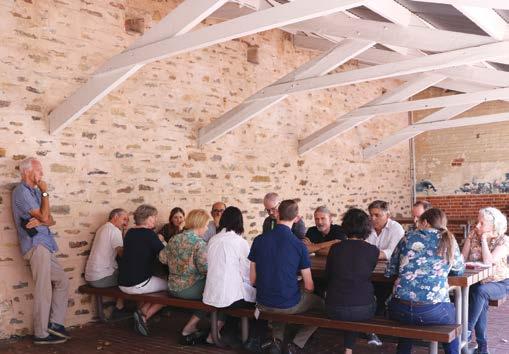
No room at the inn … To add insult to injury SA Museum management would not provide a meeting room for staff to meet with the PSA to discuss the impact of the restructure. Instead, this meeting in March was held outside in The Stables, adjacent to the State Library of SA.
A 2023 internal review of the Museum’s science and research programs involved interviewing a small number of Museum staff. There was no apparent consultation with broader stakeholders or long-term research partners.
“There also seemed to have been a failure to consult with First Nations communities and individuals about the care and protection of their cultural heritage and sensitive materials, and how this could be continued in a First Nations-led culturally respectful way under the proposed changes,” Natasha Brown said.
Key among the functions of the Museum, as set out in the South Australian Museum Act 1976, are “to carry out, or promote, research into matters of scientific and historical interest” and “to accumulate and care for objects and specimens of scientific or historical interest”.
“If this proposed restructure were to be implemented, there was a very real risk of deterioration and loss of important cultural, historical and scientific material,” Natasha Brown said.
“Members have concerns about how the Museum’s existing collections would be maintained and managed should there be an exodus of experienced and qualified staff, and with the move to broadening the curatorial and collection duties of remaining staff.
“In fact, the Museum may not be able to comply with some of its key responsibilities under the South Australian Museum Act.
“What was being proposed was a radical transformation of the SA Museum, which if implemented would have a very real impact on our ability to gain and retain knowledge about our world.”
In April, PSA members and staff joined around 500 Museum supporters for a rally on the steps of Parliament House.
Natasha Brown addressed the rally, highlighting what was at stake if the proposal were to proceed, including the “loss of the museum’s reputation as a world leader in biological science research”.
“The proposed changes could see the exodus of a collective 474 years of expertise from the museum,” she told the rally.
Natasha Brown said South Australia was experiencing a period of great prosperity at the moment, and cultural institutions such as the SA Museum should enjoy some of the benefits of that prosperity.
“This is a great opportunity for the museum to truly reimagine itself as both a worldclass research institution and a state-of-the art protector and promoter of cultural and scientific knowledge through new displays and exhibitions,” she said.
Editor’s Note: In April, the PSA lodged an industrial dispute with the SA Museum over consultation around the restructure. The matter was due to go to arbitration before the South Australian Employment Tribunal in late May.
Public sector agencies will be under increased scrutiny following the introduction of new Work Health and Safety regulations, which focus on psychosocial hazards in the workplace.

The Work Health and Safety (Psychosocial Risks) Amendment Regulations 2023 under the Work Health and Safety Act 2012, which came into effect on 25 December 2023, explicitly state a range of hazards to workers’ wellbeing and mental health, the obligations of the employer to mitigate those risks, and the penalties they face for not doing so.
The regulations define what constitutes a psychosocial hazard or risk, the process for managing the risks and also the control measures.
Psychosocial hazards are defined as hazards relating to the design or management of work; the working environment; plant at a workplace; or workplace interactions or behaviours,which may cause psychological and physical harm.
South Australia’s regulations follow similar moves interstate and in the federal industrial jurisdiction. The reforms were sparked by a 2018 independent review of Australia’s model work health and safety laws, which called for greater guidance on dealing with psychosocial risks.
However, the new regulations drew fierce opposition from employer groups in this state, who lobbied hard in the Industrial Relations Consultative Council to water down the provisions.
“It was only through the relentless efforts of the South Australian union movement that we were able to get this important legislative change across the line,” said PSA General Secretary Natasha Brown.
“This is an extremely significant win for working people and a long overdue acknowledgement that work can be responsible for adversely affecting mental health.”
A Managing psychosocial hazards at work: Code of Practice has been developed by SafeWork Australia to support employers and employees.
According to 2021-22 data from the Australian Bureau of Statistics, 6.8 per cent of work-related injuries are for stress or other mental health conditions. Where this is identified as the cause of an injury, it accounts for an average of 44 days taken off work. SafeWork Australia estimates that more than 7,200 Australians a year are compensated for psychological injuries, with 92 per cent of serious psychological injury claims attributed to work-related stress.
In the South Australian Modern Public Sector Enterprise Agreement: Salaried 2017, the PSA proposed and won the requirement for public sector employers to provide accredited mental health first aid training of workplace Health and Safety Representatives and First Aid Officers.
Mental health first aid equips individuals with skills to recognise and respond to someone experiencing a mental health problem or
mental health crisis, until professional help is received or the crisis resolves.
The stakes can be very high if psychosocial hazards are not addressed within the workplace. Statistics show that most deaths by suicide are among people of working age, with Suicide Prevention Australia reporting that suicide is the leading cause of death for men aged 25 to 44 and women aged 25 to 34.
The World Health Organization suggests worker suicide is a result of complex interaction between individual vulnerabilities and work-related environmental factors that trigger stress reactions and contribute to poor mental wellbeing.
• Have policies around a mentally healthy workplace
• Ensure staff awareness of policies
• Mental health check-ins with staff
• Conduct formal surveys on workplace culture
• Debriefing and support for frontline staff
• Stress relief activities in the workplace
• EAP programs
• Promotion of suicide prevention support
• Skills training for HR/managers to raise concerns with staff in a supportive and reassuring manner
• Encourage dialogue in the workplace about mental health.
Psychosocial hazards can create stress. Stress is the body’s reaction when a worker perceives the demands of their work exceed their ability or resources to cope.
Stress creates a physiological and psychological response in the body by releasing adrenaline and cortisol, raising the heart rate and blood pressure, boosting glucose levels in the bloodstream and diverting energy from the immune system to other areas of the body.
Stress itself is not an injury but if it becomes frequent, prolonged or severe it can cause psychological and physical harm.
Some hazards cause stress when a worker is exposed to the risk of that hazard occurring as well as when they are directly exposed to the hazard itself. For example, workers exposed to workplace violence are likely to experience stress if they perceive that the risk has not been controlled, even if the violence does not occur again. In this situation, despite the hazard rarely occurring, the stress itself may be prolonged.
Source: Managing psychosocial hazards at work – Code of Practice
If you wish to raise any issues around psychosocial hazards in your workplace, contact your local Health and Safety Representative or the PSA Members’ Rights Hotline on 8205 3227.
• 84 per cent reported exposure to traumatic events, distressing situations, or distressed/aggressive clients/customers.
• 85 per cent reported witnessing unfair practices by management.
• 35 per cent reported experiencing gendered violence, including sexual harassment or sexual assault.
• 91 per cent reported conflict with co-workers or management.
• 92 per cent felt changes at work were poorly managed.
• 66 per cent admitted to feeling ‘always’ or ‘regularly’ stressed.
• 74 per cent reported experiencing bullying in the workplace.
• 82 per cent said they were required by employers to skip rest breaks resulting in increased stress and fatigue.
• 59 per cent reported discrimination and harassment based on sex, race, gender identity, sexual orientation, and/or disability.
• 58 per cent reported violence and threats at work.
Source: 2023 Work Shouldn’t Hurt Survey, ACTU

If you or someone you know is in crisis and needs help now, call triple zero (000).
You can also contact these services for support.
Contact Lifeline for support if you are experiencing a personal crisis or have suicidal thoughts. You can call Lifeline 24 hours a day, 7 days a week from anywhere in Australia.
Beyond Blue provides information and support to help everyone in Australia achieve their best possible mental health, whatever their age and wherever they live.
Suicide Call Back Service –1300 659 467
Call the Suicide Call Back Service for immediate, professional 24/7 telephone counselling to people who are affected by suicide.
1300 789 978
MensLine Australia is a telephone and online counselling service for men with emotional health and relationship concerns. Men can contact them for free professional support from anywhere in Australia 24 hours a day, 7 days a week.
13YARN provides free and confidential crisis support to Aboriginal and Torres Strait Islander peoples. You can contact 13YARN from any mobile or pay phone anywhere in Australia 24/7 to talk to a crisis supporter.
QLife provides anonymous and free LGBTI peer support and referral for people in Australia wanting to talk about sexuality, identity, gender, bodies, feelings or relationships. QLife’s phone service is open every day from 3:00 pm to midnight.

In recent times there has been a flurry of media articles touting the employer line about the need to get people back into the office – that the days of working from home (WFH) are over.
WFH is just one of the flexible working options available to many public sector employees.
While WFH was forced on many workers as the COVID-19 pandemic took hold between 2020 and 2022, some found that the new paradigm actually suited them. They were able to achieve their work outcomes and also improve their work/life balance.
More flexible working options is an example of how the workplace has evolved and something that is worth fighting for as it signals a maturity in the workplace.
On the topic of flexible working arrangements, the Commissioner for Public Sector Employment’s Determination 8 – Implementing Flexibility states that:
“Delegates will objectively consider any flexibility request from an employee against the impact on service delivery and organisational imperatives. The focus should remain on whether the arrangements can be supported rather than the reason for the application.
Consideration should be given to whether alternative arrangements such as job redesign, job share or technology could practically be utilised to support the request.”
While any worker can request flexible working arrangements – and it can be an individual arrangement between an individual employee and their employer – the Federal Fair Work Act (which covers employees on Federal Awards) provides for a legal requirement for employers to consider flexible working arrangements for those who are full-time or part-time employees, who have worked for the same employer for at least 12 months and are:
• the parent, or have responsibility for the care, of a child who is school aged or younger
• a carer (under the Carer Recognition Act 2010)
• a person with disability
• age 55 or older
• pregnant
• experiencing family and domestic violence, or
• providing care or support to an immediate family or household member who is experiencing family and domestic violence.
Similarly, the South Australian Government has firmly nailed its colours to the mast when it comes to flexible work in this state’s public sector.
The Commissioner for Public Sector Employment (CPSE) Determination And Guideline: Flexible Workplace states:
“In line with the Directions of the Premier: Flexibility for the Future, prior to advertising for any vacancy, serious and positive consideration must be given to whether, and if so, how the role can be redesigned to enable access to flexible working arrangements, including, but not limited to part time or job share. All positions must be advertised to include the following statement about the availability of workplace flexibility: The South Australian public sector promotes diversity and flexible ways of working including part-time. Applicants are encouraged to discuss the flexible working arrangements for this role.”
And this view is reiterated in the CPSE document Flexibility At Work: Information For Managers And Employees:
“Our approach to flexibility is underpinned by the Public Sector Values and the Code of Ethics for Public Sector employees.
It is also consistent with the Public Sector Act 2009, the Government’s ‘All Roles Flex’ policy and the Flexibility for the Future initiative, which is open to employees at all levels.
“To achieve our vision we need different approaches to how we manage our work, ourselves and our business to succeed. This resource, which will be regularly updated, is designed to give you practical support and guidance if you are seeking flexible arrangements or are responsible for implementing flexible arrangements in your team. We are committed to asking “if not, why not?” I encourage you to think about how flexible working arrangements could benefit you and your team.”
It is generally accepted that flexible working arrangements can be defined in a number of ways, with the aim being to better balance an employee’s work with other aspects of their lives. The Federal Fair Work Commission cites some common examples as:
• flexible start and finish times
• compressed hours (working more hours each day, but over fewer days)
• changing from full-time to part-time or casual work
• job sharing
• flexible rostering
• working from home or another location
• ‘purchasing’ extra paid leave
• unpaid leave
• taking rostered days off as two half days
• time off in lieu
• flexitime (allowing employees to ‘bank’ extra hours which are then exchanged for time off)
• gradual increase or decrease in work hours (for example, after parental leave, or as an employee transitions to retirement).
Clause 13 (‘Worklife Flexibility’) of the South Australian Public Sector Enterprise Agreement: Salaried 2021 provides further guidance around workers’ rights to flexible working arrangements, and specifically states in Clause 13.2 that: “Agencies will promote and improve the awareness of Voluntary Flexible Working Arrangements (VFWAs).”
And Clause 23.1 (‘Workplace Flexibility’) states that: “The parties agree that an agency may negotiate and reach agreement at a workplace level with employees within that workplace (including an individual employee), on more flexible employment arrangements that will better meet the operational needs of the workplace having regard to the needs of employees (including taking into account employees’ family and other nonwork responsibilities).”
While some in the media may be campaigning to reduce workers’ rights to flexible employment conditions, research targeted at management clearly illustrates the benefits to both employers and employees.
A July 2023 article published on www.forbes.com¹ provides employers with evidence-based strategies for employee retention. Three of the top four strategies involved greater flexibility for employees, namely:
• Let your employees work from home
• Provide flexible scheduling and reduced workdays
• Encourage and promote a work-life balance
The Australian Government’s Workplace Gender Equality Agency (WGEA) has released a business case for flexible work, which states that: “Attracting and retaining diverse talent is crucial to future-proofing the workplace and the Australian economy more broadly. Making workplaces more flexible and responsive to the needs of employees is a key way of doing this.”
The business case highlights flexible work as a retention strategy and also a practice that will yield:
• increased employee wellbeing and happiness
• improved organisational productivity
• an increased proportion of women in leadership
• future-proofing of the workplace.
It cites that the proportion of Australian organisations in the private sector with flexible working strategies has now exceeded 78 per cent. Access to flexible working arrangements is also a key requirement to receive an Employer of Choice for Gender Equality citation from the agency.
• All public sector employees have a right to request flexibility.
• Agencies are encouraged to give positive consideration to any request from employees, including executives, provided it is practicable and appropriate.
• Flexibility can be applied to an employee’s pattern of work, hours of work, or their work location.
• Not all types of flexibility will work for every role. If a requested flexible working arrangement cannot be accommodated because of the nature of the role, the manager and employee should work together to determine if different flexible arrangements will work.
Source: Flexibility at Work: Information for Managers and Employees
¹ Crail , Chauncey, “15 Effective Employee Retention Strategies In 2024,” www.forbes.com, 13 July 2023, https://www.forbes.com/advisor/ business/employee-retention-strategies/.

By shifting our focus from work/ life balance to life/work balance, we acknowledge that life encompasses so much more than our professional pursuits. Our wellbeing, relationships, hobbies, and personal growth all play integral roles in leading fulfilling lives.
Placing work as the dominant aspect creates an unbalanced perception, devaluing the richness and importance of our personal experiences.
When we prioritise life over work, we emphasise the significance of personal wellbeing. Our mental, emotional, and physical health directly impacts on our productivity and overall happiness. Neglecting self-care can lead to burnout, decreased motivation, and strained relationships. By embracing life/work balance, we acknowledge that a healthy, balanced life is the foundation for success in all aspects, including our careers.
Shifting the focus to life/work balance encourages organisations to foster environments that support the holistic wellbeing of their employees.
In our fast-paced society, the concept of work/life balance has been a hot topic for years. We often hear about the importance of finding a healthy equilibrium between our professional responsibilities and personal lives. However, this perspective suggests that work takes precedence, inadvertently implying that personal life is secondary. It’s time for a paradigm shift. Instead of referring to it as work/ life balance, let’s embrace the idea of life/work balance, emphasising the significance of putting our wellbeing and personal fullfilment first.
Companies that prioritise employee wellness and work-life integration benefit from higher productivity, lower turnover rates, and increased employee satisfaction.
By acknowledging the importance of personal life within the broader context of work, organisations can create flexible schedules, promote work-life harmony, and offer resources for personal development and growth.
When we prioritise life before work, we acknowledge the significance of our relationships and connections. Maintaining strong bonds with family, friends, and loved ones is essential for a fulfilling life. By embracing life/ work balance, we allow ourselves the time and energy to cultivate meaningful relationships, fostering a support system that enhances our overall wellbeing.
Life is an ongoing journey of personal growth and self-discovery. When we shift our mindset to life/work balance, we recognise the importance of pursuing our passions and interests outside of work. Engaging in hobbies, pursuing
creative endeavours, and continuous learning contribute to personal fulfillment and a sense of purpose. By embracing a holistic approach to life, we create a more fulfilling and meaningful existence.
The concept of life/work balance places the emphasis on harmony rather than strict separation. It acknowledges that our personal lives and professional responsibilities are intertwined and impact on each other. Striving for balance means being adaptable and finding harmony in the ebb and flow of life’s demands. It means being present and fully engaged, whether at work or in personal endeavours, while maintaining a healthy integration of both.
Editor’s note: In the interests of work/life balance, this article was produced by the PSA’s Communications Officer with assistance from Chat GPT
Jessie Skidmore knows that knowledge is power in the workplace, and being involved in her union gives her the ability to influence change.
The PSA Worksite Representative, who works in an operations role at SA Pathology, mostly in the Northern Adelaide Local Health Network catchment, values how the PSA guides and supports members to deal with issues at work.
And her workplace has had its share of issues, not least the push to privatise pathology services first by a former Labor Government and then by the Marshall Liberal Government, virtually on the eve of the COVID-19 pandemic.
The threat of privatisation saw many workers leave SA Pathology fearing their job security was in jeopardy, which left the organisation depleted as it responded to the global pandemic.
“Towards the end of 2019, there was a lot of talk about pulling back the workforce and cutting back on staff. We actually lost a lot of staff, really good staff who were very experienced,” Jessie said.
The irony that SA Pathology emerged as one of the great public sector heroes during the pandemic is not lost on her.
“When COVID-19 hit, we were on very low staff ... it was a really bad time to have lost so many staff and we had to

pull through with what we had – very limited staff with a big workload. I think that was one of the most challenging things,” she said.
A 19-year veteran of SA Pathology and the former Institute of Medical and Veterinary Science (IMVS), Jessie is a committed public sector worker, who loves the variety of her job. Her work includes everything from customer service, phlebotomy (taking blood samples), to preparing specimens for testing in the laboratory.
For several months from late 2022, Jessie was seconded to the PSA office as a Member Organiser, which provided her with the opportunity to see how the union operates from the inside and equipped her even more for organising in her workplace.
In her role as a PSA Worksite Representative, Jessie has been able to work more closely with the PSA office and also network with other members at various forums and training. She regularly liaises with PSA staff to ensure she has the right information and resources to support her colleagues at work.
“Building those bridges gives me the piece of mind as a rep that I’ve got someone
who will back me up so I can advocate for members in the workplace,” she said.
“As a worker I know my role and responsibilities, however, the union knows all the legal rights and responsibilities, codes and guidelines, employment conditions and legislation relating to employees and employers.”
Jessie said it is important for workers to become educated about their industrial rights. She recounts an incident of a colleague who became unable to drive at night, and ended up resigning from her role after being told by management that rosters could not be changed to accommodate her circumstances.
Jessie later found out that this type of discrimination against an employee, relating to a disability, was not allowed under the Equal Opportunity Act, but it was too late.
“We lost such a valuable worker and those sorts of things are really frustrating,” she said.
“If I can be on the floor as a Worksite Rep and I hear about these things, I want to inform my colleagues on what they can and can’t do and where to find information about their rights.”

The Review is keen to print short stories from PSA members’ working lives, telling of experiences and events that have given you pause for thought.
It could be an incident that highlighted the impact that your job has on people’s lives, or on your own life.
It could be the recollection of an encounter with an unforgettable person or an unlikely situation whose recollection has stayed with you.
In summary, it’s a chance to talk about the humanity underpinning your job.
Please make the people in the story anonymous, where appropriate.
Stories should be limited to 500 words and will be selected at the editor’s
Former long-time PSA Chief Industrial Officer Peter Christopher was awarded the Medal of the Order of Australia (OAM) at this year’s Australia Day Honours for his service to community history.
Peter, who spent 23 years with the PSA before retiring in 2015, has been a driving force behind the effort to save the City of Adelaide clipper ship and bring it to Adelaide. He has had a decades-long interest in maritime
history and has authored several books on the subject.
Congratulations, Peter on this well-deserved honour.
discretion. Authors of published stories will receive a PSA gift card.
Email stories to enquiries@psaofsa.asn.au.

School Services Officers (SSOs), Aboriginal Education Workers (AEWs) and Early Childhood Workers (ECWs), who only work during the school terms, will no longer not need to use accrued TOIL to be paid for public holidays under one of the new provisions of the recently approved South Australian School and Preschool Education Staff Enterprise Agreement.
The provision came into effect for the Adelaide Cup public holiday on Monday, 11 March 2024 and included the Easter public holidays on Friday, 29 March and Monday, 1 April 2024.
“Throughout negotiations for the agreement the PSA pursued issues members had told us were important to them, and finally achieving some
equity in relation to public holidays was an important win,” said PSA General Secretary Natasha Brown.
The agreement sees members receive pay rises of 4 per cent back paid to May 2023, and 3 per cent annual rises over the three-year life of the agreement.
The PSA has been contacted by members who are being denied their entitlement to additional recreation leave as set out in Clause 28 of the South Australian Public Sector Enterprise Agreement: Salaried 2021.
Clause 28 states: An employee who is regularly rostered to work on active duties in ordinary hours on Saturdays, Sundays and public holidays, accrues and is credited with recreation leave at the rate of the equivalent 15.625 hours of recreation leave for each completed month of their service (equivalent to 25
working days per service year), provided that the employee works at least 20 Sundays and Public Holidays in a year.
It is the PSA’s position that there is no ambiguity about this entitlement. Members who are regularly rostered to work on weekends and public holidays, and who work at least 20 of these days, should accrue leave at the rate of 15.625 hours for each completed month of service.
This entitlement should not be denied to those who work in accordance with the
The PSA also secured an undertaking from the Department for Education to conduct an audit of working arrangements for ancillary staff.
“This audit will identify possibilities for conversion of positions to permanency,” Natasha Brown said.
above, irrespective of whether they have a compressed working arrangement, work only on a part-time basis or due to any other misguided justification provided by the employer.
If you have concerns that you may be missing out on your entitlement, please contact the PSA Members’ Rights Hotline on 8205 3227 or at enquiries@psaofsa.asn.au for clarification and assistance.
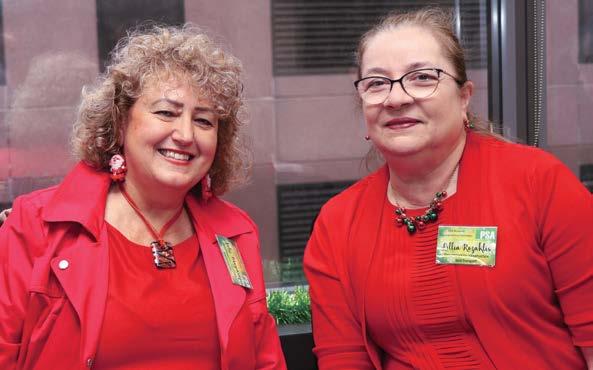

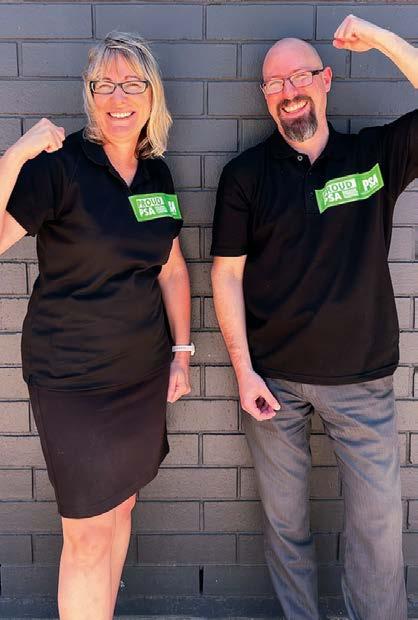
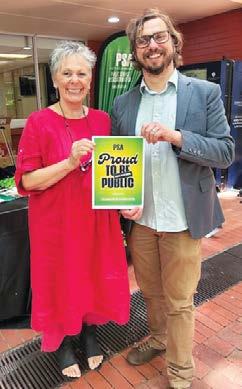
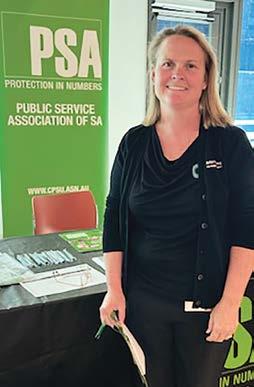
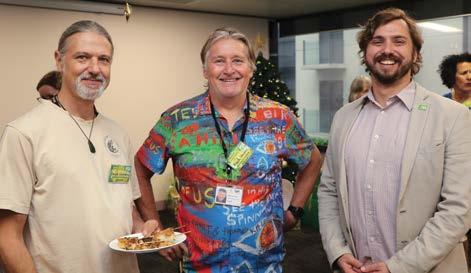
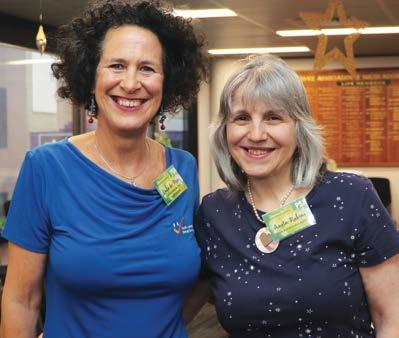

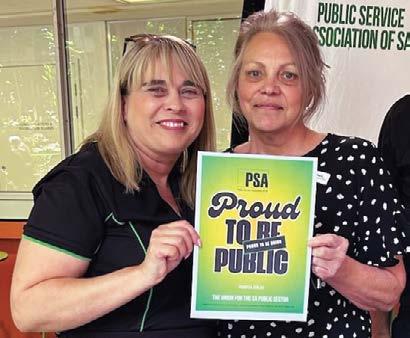
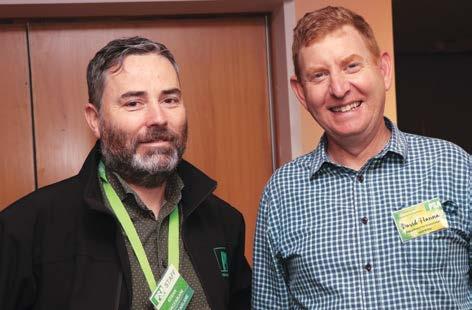
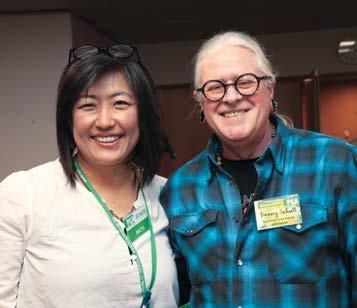

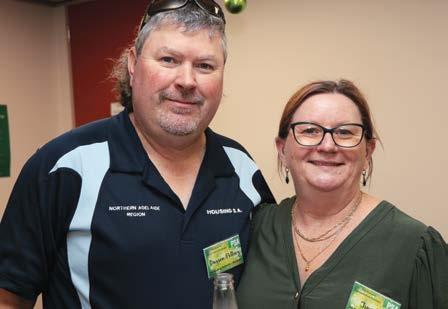
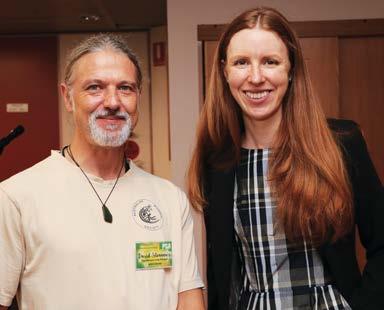
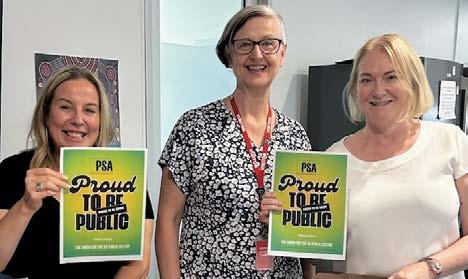
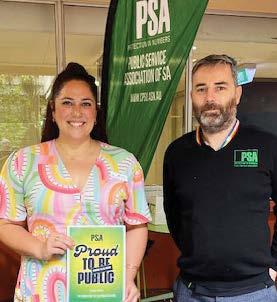

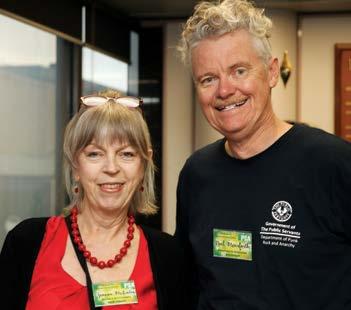
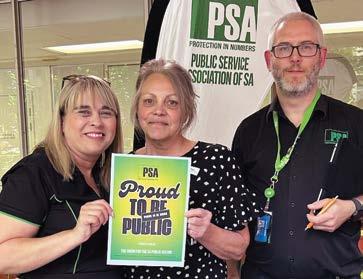
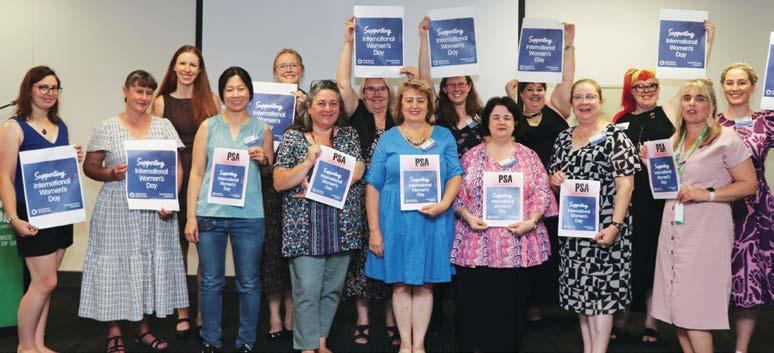
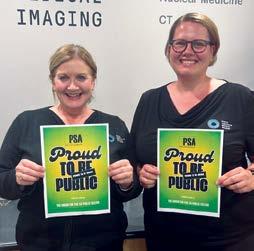
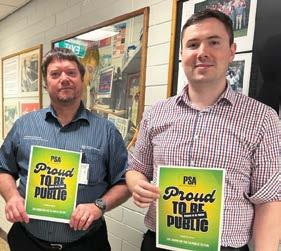

The overseas humanitarian aid agency of the ACTU

When the war erupted in Gaza after 7 October 2023, Union Aid AbroadAPHEDA swiftly established direct communication with its longstanding partner organisation in Palestine, the MA’AN Development Center.
Despite the escalating humanitarian crisis, MA’AN bravely committed to delivering emergency relief aid in the Gaza Strip, with 250 local staff. In response, Union Aid Abroad-APHEDA rallied support, and through the solidarity of union staff and activists, raised more than $600,000 to reinforce MA’AN’s critical humanitarian operations.
Since 1989, Union Aid Abroad-APHEDA has supported development and humanitarian initiatives alongside MA’AN, a secular, national, and independent organisation dedicated to combating the enduring crises of unemployment, poverty, environment, and food insecurity in Gaza and the West Bank. Previous projects focused on empowering women through cooperatives and agriculture, aiming to provide them with avenues to earn decent incomes.
The projects in Gaza unfolded in an extraordinarily challenging context.
Following attacks by the Israeli military, MA’AN’s Gaza offices are in ruins. However, the dedicated workers, many of whom have lost family members, persist in their mission to deliver aid. In this dire context, they provided:
· Cash assistance and vouchers: Immediate relief for affected families.
· Mental health and psychosocial “first aid”: Services designed to aid children and families affected by the aggression.
· Dignity and hygiene kits: Distributed to displaced individuals and households, these kits include essential items.
· Non-food items for IDPs: Winterised tents, bedding sets, winter clothes kits, and other necessities provided for internally displaced persons.
· Emergency WASH interventions: Ensuring vulnerable populations have access to clean drinking water and sanitation services.
· Provision of hot meals and food baskets: Addressing immediate nutritional needs.
While Union Aid Abroad-APHEDA’s annual appeal has concluded, the crisis in Gaza persists, and MA’AN remains committed to providing emergency support
as long as needed, and then transitioning to the immediate recovery phase, when millions of people will still be homeless. The challenges ahead demand a sustained and intensified effort to rebuild Gaza.
Australian Unions have a long history in campaigning for peace and international social justice. The ACTU has called for an end to the occupation of Palestinian lands, and demanded an immediate ceasefire, along with massive aid to people in the Gaza Strip. International union bodies have called to restore funding for the main UN agency for Palestinian refugees, UNRWA, and have called for respect for the rulings on preventing genocide by the International Criminal Court.
You are invited to become a Union Aid Abroad-APHEDA member and contribute to the ongoing global justice efforts in Palestine, Lebanon, and other regions where working people are fighting for social justice. Your support can make a meaningful difference in the lives of those affected by conflict and crisis.
To find out more visit www.apheda.org.au

If you have reached age 60, you could ease into
The way it works is simple: you could reduce
If you have reached age 60, you could ease into retirement with a Transition to Retirement arrangement. The way it works is simple: you could reduce your hours and supplement your
regular income from your super.
Retirement is a big step, and not everyone is ready to retire once they reach age 60. You might want to keep working because you enjoy working, or perhaps you want to maintain your current income to avoid having to change your lifestyle.
Retirement is a big step, and not everyone is ready to retire once they reach age 60. You might want to keep working because you enjoy working, or perhaps you want to maintain your current income to avoid having to change your lifestyle.
A Transition to Retirement (TTR) arrangement is designed to help with those situations.
A Transition to Retirement (TTR) arrangement is designed to help with those situations.
By rolling over a portion of your super into an Income Stream, you could access between 4% and 10% of the account balance each financial year as regular payments. If you decide to work less, the payments could top up your take home pay, allowing you to earn the same.
By rolling over a portion of your super into an Income Stream, you could access between 4% and 10% of the account balance each financial year as regular payments. If you decide to work less, the payments could top up your take home pay, allowing you to earn the same.
After turning 60, payments from your Income Stream become tax-free.
After turning 60, payments from your Income Stream become tax-free.
After turning 65, you can access as much of your super as you like each financial year, withdraw lump sums at any time, and any investment earnings in your Income Stream account become tax-free.
After turning 65, you can access as much of your super as you like each financial year, withdraw lump sums at any time, and any investment earnings in your Income Stream account become tax-free.
pay with regular income from your super. supersa.sa.gov.au
Not ready to reduce your work hours? You could still benefit from a TTR arrangement by using it to boost your super without reducing your take home pay.
Not ready to reduce your work hours? You could still benefit from a TTR arrangement by using it to boost your super without reducing your take home pay.
Rather than working less and supplementing your income with regular payments from your super, you could continue working full-time, start a salary sacrifice arrangement with your employer, and top up the amount you salary sacrifice with regular payments from your super.
Rather than working less and supplementing your income with regular payments from your super, you could continue working full-time, start a salary sacrifice arrangement with your employer, and top up the amount you salary sacrifice with regular payments from your super.
You need to meet the following requirements to be eligible for a TTR Income Stream:
You need to meet the following requirements to be eligible for a TTR Income Stream:
• Reached your preservation age, which for most is age 60.
• Reached your preservation age, which for most is age 60.
• Have at least $36,500 in your Triple S account (a minimum of $30,000 must be rolled over to the Income Stream and your Triple account must retain a minimum of $6,500).
• Have at least $36,500 in your Triple S account (a minimum of $30,000 must be rolled over to the Income Stream and your Triple account must retain a minimum of $6,500).
To see how you can work less and earn the same, refer to the case study below:
To see how you can work less and earn the same, refer to the case study below:
Terry is aged 60 and earns $77,500 a year. They have built up a super balance of $300,000 in their Triple S account.
Terry is aged 60 and earns $77,500 a year. They have built up a super balance of $300,000 in their Triple S account.
Working 5 days per week:
Working 5 days per week:
Terry wants to reduce their working hours from full-time to 0.8 and retire at 65. They could achieve this by accessing regular income payments via an Income Stream to supplement the $62,000 they earn working 4 days a week.
Terry wants to reduce their working hours from full-time to 0.8 and retire at 65. They could achieve this by accessing regular income payments via an Income Stream to supplement the $62,000 they earn working 4 days a week.
Working 4 days per week:
Working 4 days per week:

Life isn’t always smooth sailing. Some days are overwhelming and difficult. It’s not realistic to live a stress-free life, but it’s possible and important to know how to deal with tough situations when they arise.
Mindfulness is a tactic to help tackle anxiety and everyday stresses. It can help to slow down your mind when it starts racing and it can sharpen your concentration skills. Here’s everything you need to know about this simple practice.
Mindfulness is about being present and fully engaged with whatever you’re doing at that moment. It’s about being free from distraction or judgment and being aware of your thoughts and feelings without getting caught up in them.
When you are faced with a difficult situation, knowing how to put mindfulness into practice can help give you a better chance of being nonreactive and responding in a more calm and effective manner.
Clarity, calmness and improved focus are some of the psychological benefits of meditation that can happen within the first few weeks of starting the practice.
Over time, you’ll start experiencing longterm benefits, which can include:
• Enhanced memory and cognition
• Heightened motivation
• Improved communication
• Improved quality of sleep
• Increased energy and stamina.
Each individual is different, but consistency and commitment are key to seeing results and improvements.
How do you practise mindfulness? In the beginning, practising mindfulness, especially in the form of meditation, can be a foreign concept for many people. However, the more you do it, the easier it will become.
Meditation is the training ground for learning mindfulness. At first you meditate to become familiar with the here and now for a limited period of time. Eventually, through regular practice you’ll be able to be present throughout the day, every day.
It has been scientifically proven that regular meditation practice can actually change the shape of your brain by strengthening important areas and decreasing others. Neuro-imaging studies have proven that after just eight weeks of regular meditation, grey matter density in the brain has increased. Grey matter is responsible for
We’re a fund that’s 100% not-for-profit, so you get more of the good stuff. Get an ongoing 6% discount on your health cover.
or get
quote
executive functions, such as emotional regulation, planning and problem solving.
The cortical thickness of the brain also increases, which has an impact on your learning and memory processes.
The part of the brain that is in charge of how we feel stress, fear and anxiety, also known as the “fight or flight” centre can actually shrink with mindfulness practice as well. .With regular meditation practice, you have the chance to rewire your brain towards more positive thoughts and experiences long term.
–Disclaimer: The information contained here is of a general nature and does not take into account your personal medical situation. The information is not a substitute for independent professional medical advice and is not intended to diagnose, treat, cure or prevent any disease or be used for therapeutic purposes. Should you require specific medical information, please seek advice from your healthcare practitioner. Health Partners does not accept any liability for any injury, loss or damage incurred by use of or reliance on the information provided. While we have prepared the information carefully, we can’t guarantee that it is accurate, complete or up-todate. And while we may mention goods or services provided by others, we aren’t specifically endorsing them and can’t accept responsibility for them.

Thinking about contesting an estate? In South Australia, legislation enables someone who’s been either left out of an estate or hasn’t received adequate provision to make a claim against the deceased’s estate.
When it comes to contesting an estate, it’s important to get legal advice as soon as possible. This is because in South Australia there are restrictions on who can dispute an estate, as well as strict time limitations in place.
Each state has its own legislation, so it’s important to get legal advice on the laws that apply. Here’s a brief overview of contesting an estate in South Australia.
This information addresses the current law in South Australia. Parliament has, however, passed new legislation called the Succession Law Act, which will significantly alter the law. While this Act has been passed a commencement date is yet to be advised.
In SA, you’re only entitled to contest an estate under the Inheritance (Family Provision) Act (IFP Act) if you fit into one of the following categories:
• You were the spouse (husband or wife) of the deceased person;
• You are a person who was married and now divorced from the deceased person (an ex-spouse can contest a will);
• You were the domestic partner of the deceased person (including same sex couples);
• You were a child of a spouse or domestic partner of the deceased person (provided you were being maintained wholly or partly or legally entitled to be maintained wholly or partly by the deceased person immediately prior to his or her death);
• You were the child of the deceased person;
• You were a grandchild of the deceased person;

• You were a parent of the deceased person (provided you can satisfy the Court that you cared for or contributed to the maintenance of the deceased person during his or her lifetime); or
• You were a brother or sister of the deceased person (provided you can satisfy the court that you cared for and contributed to the maintenance of the deceased person during their lifetime).
Unless you fit into one of the above categories, you will not have standing to contest an estate under the IFP Act. The Succession Law Act does alter who can contest an estate.
There’s a strict time limitation that must be adhered to under the IFP Act. An application to contest an estate must be filed with the Supreme Court and served on the executor within six months of a grant of probate or grant of letters of administration being issued.
The strict time limitation can sometimes be extended but it’s at the discretion of the court and an extension shouldn’t be relied on. If you miss the applicable time limitation, you may be stopped from taking any further action by the court, particularly in circumstances where the estate has already been fully distributed.
A beneficiary can contest an estate in SA whether they’re named in the will or not, provided they can establish that the deceased didn’t make adequate provision for them and they’re eligible to make a claim.
If you’re wondering how to stop someone contesting an estate in Australia, we recommend you seek specialist legal advice specific to your circumstances.
In addition to the IFP Act, there are a number of circumstances where a will may be challenged based on its validity. A will might be deemed invalid if the will maker made the will in circumstances where they were mentally incapacitated, subject to undue influence, or there were suspicious circumstances, or the will is fraudulent.
If you are considering challenging a will it is important to get legal advice early on and, if appropriate, lodge a caveat with the Probate office to stop a grant of probate being issued on an invalid will.
If you are considering contesting an estate or challenging a will, the next step is to seek professional legal advice. Making a claim against the estate can be a complicated, stressful and drawn out process, so working with specialist lawyers who are experienced in this area, and who take the time to understand your claim is really important.
Johnston Withers Lawyers has been helping South Australian families, individuals, businesses and communities for more than 75 years. Sometimes life is complicated, and that’s when experience matters.
If you’d like advice or direction from a lawyer about contesting an estate or challenging a will in South Australia, please contact Caitlin Walkington on (08) 8231 1110, or at caitlin.walkington@johnstonwithers.com.au
Disclaimer: This article is intended to provide a generalguidetothesubjectmatter.Specialist advice should be sought about your specific circumstances.
Kangaroo Island
$600 peak / $455 off-peak $1553 (3-bedroom holiday home) $ 1,730 (3-bedroom holiday home)
Port Lincoln $495 peak / $355 off-peak $911 (2-bedroom unit)
$1,130 (2-bedroom apartment)
They’re two of the most popular tourist destinations in South Australia – and among the most expensive –that is if you’re not a PSA member.

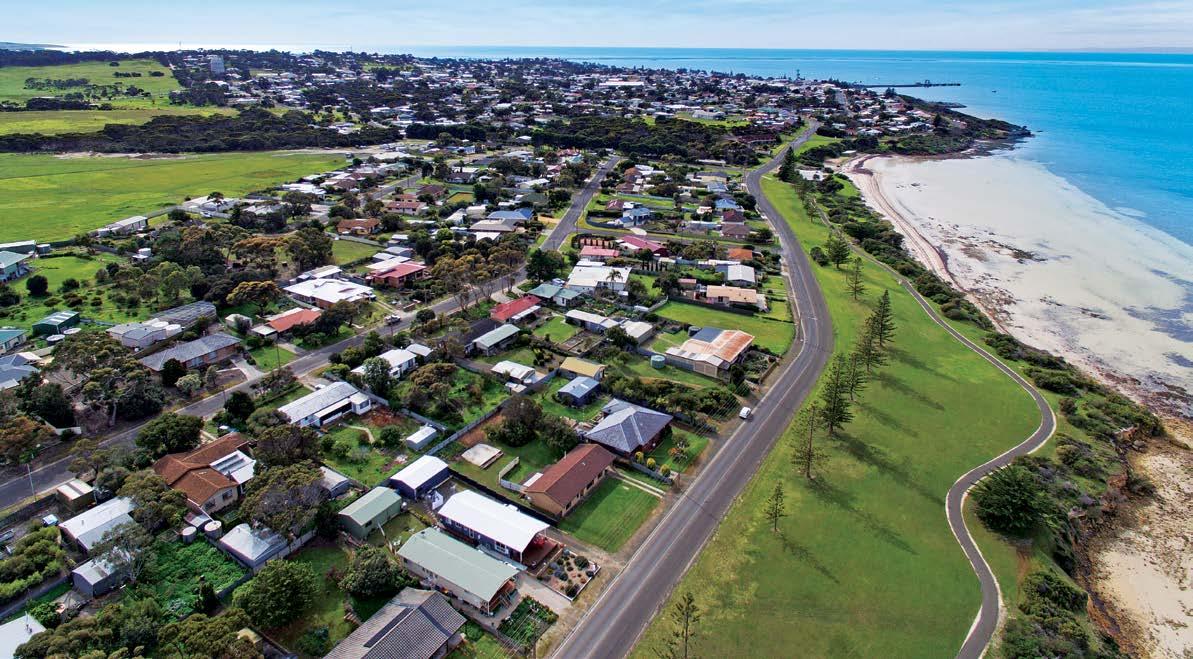
Kangaroo Island and Port Lincoln offer incredible natural surrounds and a great range of activities for anyone who loves nature or the sea.
PSA members have the opportunity to book one of our holiday homes at Port Lincoln or Kangaroo Island for a fraction of the cost of commercial holiday rentals. The only proviso is you need to plan ahead because our holiday homes in these two locations book out early.
Kangaroo Island is known for its unique wildlife, stunning landscapes and unspoiled beauty. Visitors to the island can experience an array of outdoor activities, including hiking, wildlife viewing, and scenic drives.
One of the main attractions of Kangaroo Island is its abundant wildlife. The island is also home to the famous Flinders Chase National Park. Located in the park are the iconic Remarkable Rocks and Admirals Arch. Kangaroo Island is also known for its delicious local produce, including honey, cheese, and wine. Visitors can sample these products at local markets and vineyards, or enjoy them at one of the island’s many cafes and restaurants.
Accommodation details:
• Three bedrooms (sleeping up to 6 people).
• 1 x queen bed
• 1 x single bunk
• 2 x single beds
• Pillows and blankets supplied
Facilities
• Laundry facilities
• Barbeque
• Carport for one car
• Room for boat
• Access to the beach is across the road, down a short incline
PSA Holiday Homes are the best value accommodation available and they are offered exclusively to PSA members. Check out what’s available at psaofsa.asn. au/psa-holiday-homes, email holidayhomes@psaofsa.asn.au or call our Member Benefits Team on 8205 3200 today to secure your booking.
Port Lincoln is a stunning coastal city known for its natural beauty, diverse marine life, and rich cultural heritage. With a population of around 14,000 people, Port Lincoln has a relaxed and friendly atmosphere, making it a popular tourist destination.
Surrounded by the stunning scenery of Boston Bay and Spencer Gulf, it is considered one of Australia’s top fishing destinations, offering a variety of experiences, from deep sea to freshwater.
Visitors can also enjoy whale watching, seal and sea lion encounters, and marine eco-tours. In addition to its natural wonders, Port Lincoln is also home to a number of museums, galleries, and historic sites. With its stunning landscapes, vibrant cultural scene, and endless outdoor activities, Port Lincoln is truly a must-visit destination for anyone looking to experience the beauty of South Australia.
The great thing is you can book PSA Holiday Homes a year in advance so start thinking about that dream getaway now. *Rates are for a 7-day booking for accommodation for four adults from 4 May to 11 May 2024. (Comparison sources: www.airbnb.com.au /
Accommodation details:
• Two bedrooms (sleeping up to 6 people)
• 1 x queen bed
• 2 x single bunks
• Pillows and blankets supplied
Facilities
• Barbeque
• One undercover car park
• On-site swimming pool
Union Shopper is one of the many additional benefits available to you as a PSA member.
A 100 per cent union-owned organisation, Union Shopper utilises the collective bargaining power of unions across Australia to provide great benefits and savings to members and their families. Union Shopper has been looking after members since 1975, saving money for members every day and is fully endorsed by the ACTU.
Union Shopper offers many benefits, including discounted gift cards, wine, electrical, new cars, travel, entertainment, finance and computers with members enjoying
unlimited use of these discounts and services. Not to mention hundreds of offers available for activities.
To maximise savings on electrical and white goods, use Union Shopper’s Personal Shopper service or create an online account where you’ll have access to commercial pricing from The Good Guys Commercial and JB Hi-Fi Business. Members purchasing through this platform typically save an average of 26 per cent off the ticketed price. Items already on special in retail stores are generally not discounted further through these commercial divisions, however
Union Shopper can still help you save. By purchasing discounted e-gift cards members can still achieve a 5% discount at either The Good Guys or JB Hi-Fi. Please note that gift cards cannot be used for purchases made through the commercial divisions.
To find out more about the Union Shopper service simply visit www.unionshopper.com.au or call 1300 368 117


